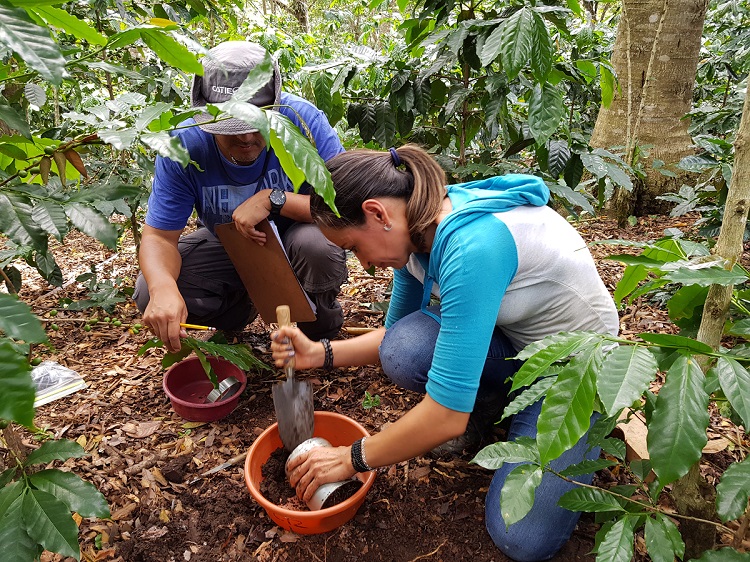Every day, over two billion cups of coffee are consumed worldwide, with the popularity of the beverage continuing to rise. Consumers can choose the strength, roast, origin, blend, style and ‘notes’ of their brew, with many also choosing to buy coffee that is certified ‘sustainable’, or with a ‘carbon-neutral’ label. How can farmers increase production to meet demand and sustain their livelihoods, whilst ensuring their beans are produced in a sustainable way?
A project led by Professor Jeremy Haggar is addressing the compromises and issues faced by coffee farmers from estates to small-scale indigenous producers in Costa Rica and Guatemala who depend on coffee for their livelihoods. The  aim of the project is to identify the production practices that maintain profitability, without damaging the environment and negatively affecting future yields.
aim of the project is to identify the production practices that maintain profitability, without damaging the environment and negatively affecting future yields.
Production can be increased by cultivating more land or increasing the intensity of production on existing land, both of which can have negative environmental effects. This project will generate evidence as to how to achieve the best balance between profitability and sustainability whilst taking into account variations in climatic conditions, plant disease outbreaks and fluctuations in market prices that affect productivity and economic returns.
The team will compare coffee agri-systems in Costa Rica, where production has been more intensive within agroforestry systems, and in Guatemala where traditional coffee agroforestry systems predominate.
Within the different coffee agri-systems, the project aims to quantify the ecosystem services – the benefits that nature provides us, and that contribute to our wellbeing – including biodiversity, soil retention, nutrient recycling, carbon storage and recreation. The research will study the role of different kinds of coffee agroforestry or ‘shaded coffee’ – growing coffee bushes under shade trees similar to how they would grow in the wild – in providing a more flexible, resilient agri-system that allows farmers to adapt coffee management according to their economic circumstances and climatic conditions.
In the first year of the project, the team has collected data from 90 farms in each country to evaluate their economic performance and indicators of the ecosystem services generated. Significantly, the majority of these farms were assessed during another project led by Prof Haggar 10 years ago. This will enable evaluation of how the farms have survived or adapted to disease outbreaks, flooding and drought and wild fluctuations in coffee price over the past decade, and establish the productive and economic farm characteristics that generate resilience to these stresses on the agri-system and farmers’ livelihoods.
There is considerable concern among both coffee producers and in the coffee industry as to the impacts of market and climate variation on the viability of the sector. The results of this project will contribute to the national climate mitigation and adaptation strategies of the coffee sector in each country, and potentially globally, by identifying the production strategies that enable producing profitable coffee, without depleting the ecosystem services that contribute to the resilience of coffee production.
‘Sustainability Intensification Trade-Offs in Coffee Agroforestry in Central America’ project partners are the Centre for Ecology and Hydrology, UK, the Tropical Agricultural Research and Higher Education Centre (CATIE) in Costa Rica and the Universidad del Valle (UVG) in Guatemala, with collaboration from the National Coffee Institutes of both countries, and is funded by the Global Challenges Research Fund (GCRF) through Biotechnology and Biological Sciences Research Council (BBSRC).
To find out more about:
Sustainability Intensification Trade-Offs in Coffee Agroforestry in Central America
Centre for Ecology and Hydrology
Tropical Agricultural Research and Higher Education Centre (CATIE)
Global Challenges Research Fund (GCRF)
Biotechnology and Biological Sciences Research Council (BBSRC)

